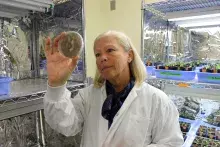
A search for natural alternatives to pesticides is one of the innovative Kwantlen Polytechnic University (KPU) research projects benefitting from nearly $600,000 of new funding.
Projects to ease access to healthy food for several Indigenous communities and develop healthy eating habits in young adults were also supported by the Natural Sciences and Engineering Research Council of Canada (NSERC) grants.
Thanks to almost $150,000 from NSERC, members of KPU’s Institute for Sustainable Horticulture installed a high pressure liquid chromatography machine that will allow them to identify how the naturally produced chemicals from beneficial funghi and bacteria can protect crops and other plants from diseases and insects. They have also added a digital droplet polymerase chain reaction device that can genetically identify all the living and recently deceased organisms in a soil sample, helping them understand the environment in which the funghi and other organisms can thrive.
Their work on biological alternatives to pesticides is pushing boundaries in the agricultural industry and the new equipment will help them expand this applied research for public and industry partners.
“What we do is fairly unique and specialized,” says Dr. Deborah Henderson, director of the Institute for Sustainable Horticulture. “It will encourage more people and companies to develop environmentally protective products.”
Meanwhile, a $238,000 NSERC grant is supporting an initiative from KPU’s Institute for Sustainable Food Systems (ISFS) to partner with First Nations to overcome challenges that can limit accessibility to healthy food choices.
ISFS plans to pair families facing such challenges with new small-scale farmers, who will provide a weekly produce box throughout the growing season. The farmers will be provided with business management and technical support, while support groups, educational tools and recipes will be available to the families. The project team will monitor dietary and physical changes.
“We believe that this award is going to result in some very positive outcomes and relationships between KPU and the First Nations,” says ISFS director Kent Mullinix, who notes that old approaches that focused on education alone had been ineffective in tackling food-related conditions such as heart disease and diabetes.
“This is going to make it easier to access fresh vegetables than going to the grocery store, and it is going to establish a relationship between the producer and the families that is going to make the food more meaningful,” he adds.
Researchers in KPU’s Health Science, Nursing, and Psychology programs are collaborating to combine personalized nutrition interventions with digitally-simulated reality and peer supports to improve life-long eating habits in young adults.
NSERC provided $200,000 for a collaboration between KPU’s health science, nursing, and psychology programs to combine personalized nutrition interventions with digitally-simulated reality and peer supports to improve life-long eating habits in young adults.
“Young adulthood is a key developmental life stage as health behaviours during this period track strongly into adulthood,” says study lead Dr. Karen Davison. “This study seeks to empower young adults by providing them with tailored nutrition interventions that integrates information about their genes, current health state and personal goals. Peer-based educational tools using online social environments, augmented reality and virtual reality will also be used to help these young adults integrate their personal plans into their daily routine.”
The KPU projects were among 94 investments across Canada through NSERC’s College and Community Innovation program and its College and Community Social Innovation Fund that were announced on November 5, 2018.
“NSERC is proud of its role as a convenor and enabler of innovation-driven activities that help businesses compete and thrive through interactions with colleges and polytechnics” says Dr. Marc Fortin, NSERC’s vice-president, Research Partnerships. “Today’s recipients also exemplify how researchers are effective at closely aligning their activities with regional needs to strengthen their communities.”